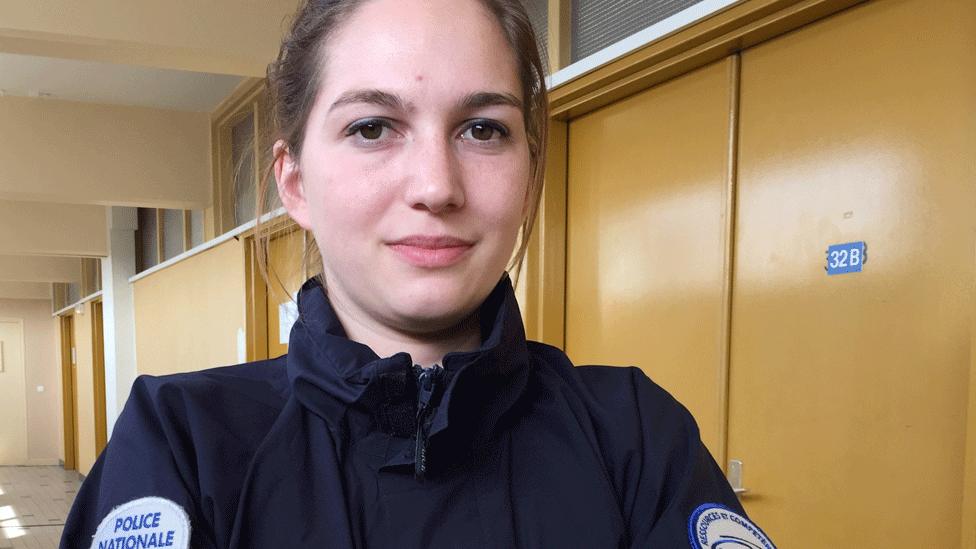Police under pressure: Who would be a French cop?
- Published
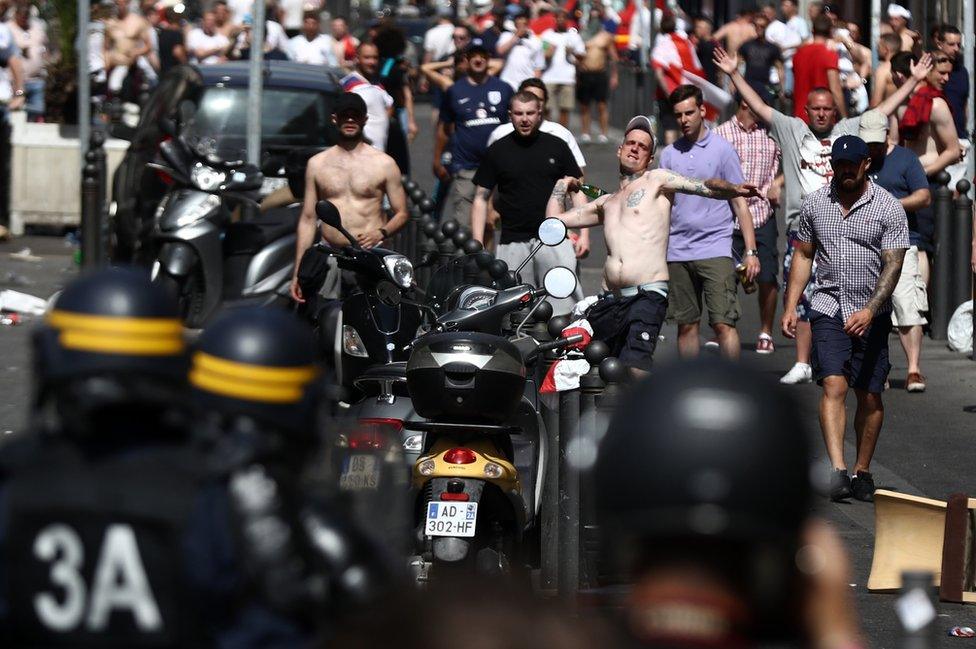
Marseille, 11 June: Police were taunted by bottle-throwing England fans
French police are "on the verge of a breakdown", according to one of their union leaders.
They are physically worn out by their multitude of tasks, morally exhausted by the constant criticism, and now - more than ever before - anxious for their very lives.
"To the universal fatigue, there has been added a new element since Monday - fear," says Jean-Marc Bailleul of the SCSI union.
The lot of France's 240,000 police and gendarmes is certainly not a happy one.
Since jihadist terror struck Paris in November they have been on extra duties for the post-attacks state of emergency. Holidays were cancelled, unpaid overtime is accumulating.
Add to that the migrant camps near Calais, which have required several companies of riot police.
Plus:
Three months of street demonstrations against the Socialist government's labour reform bill, many of which (as on Tuesday) descended into anti-police violence
The Nuit Debout (Up All Night) protest movement, whose encampments in Paris and other cities need to be controlled
A massive deployment to ensure security at the Euro 2016 football championships, with the new threat of Russian "ultra" hooligans
And then on Monday came the shocking news of two officers murdered by an Islamist in Magnanville, west of Paris.
It is small wonder that many officers feel they are at the end of their tether.
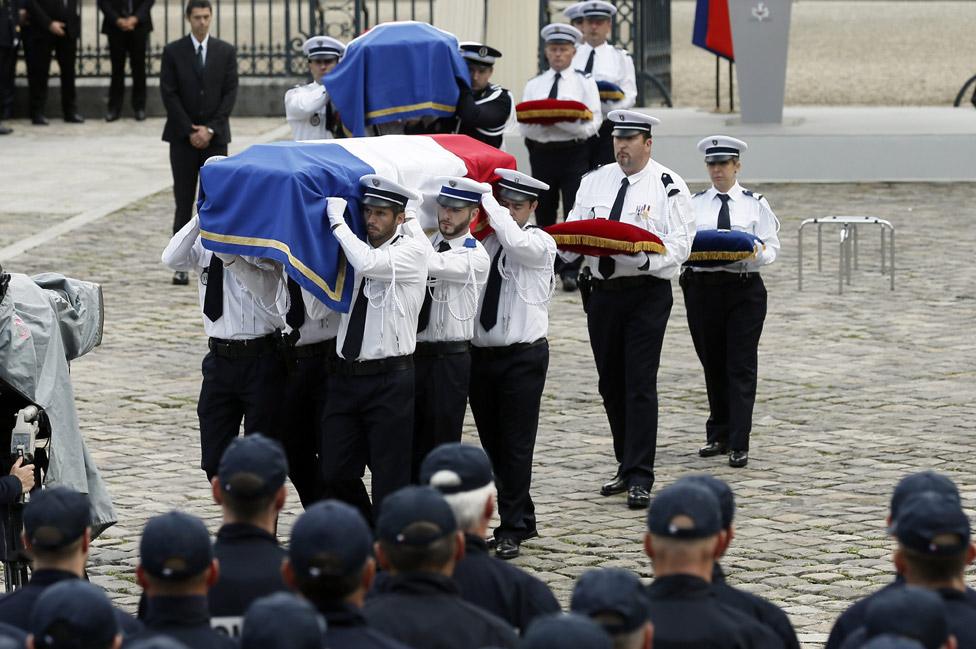
Sombre times: Police held a ceremony for two colleagues murdered by an Islamist at their home near Paris
President Francois Hollande recognises the strains.
At Friday's ceremony in Versailles for the murdered police couple, Jean-Baptiste Salvaing and Jessica Schneider, he paid tribute to the dedication of the service.
And he said he would meet some of the demands of police unions to ensure their better protection.
Lone wolves
For example, even after the state of emergency runs out next month, officers will continue to be allowed to carry handguns when off duty. And there will be extra, so far unspecified, measures to safeguard police anonymity.
The greatest fear after Monday's murders is that lone-wolf Islamists will target police officers whom they have come up against personally in the past as petty criminals.
"We've all at one time or another had contracts put on our heads by robbers or gang-leaders," says Olivier Berton of the Alliance union.
"Regularly they send out juniors to check out the cars parked outside the police station, to get the registration numbers."
Officers are now under standing instructions not to wear uniform when off duty, not to travel alone on public transport and to remove as much personal information as possible from social media.
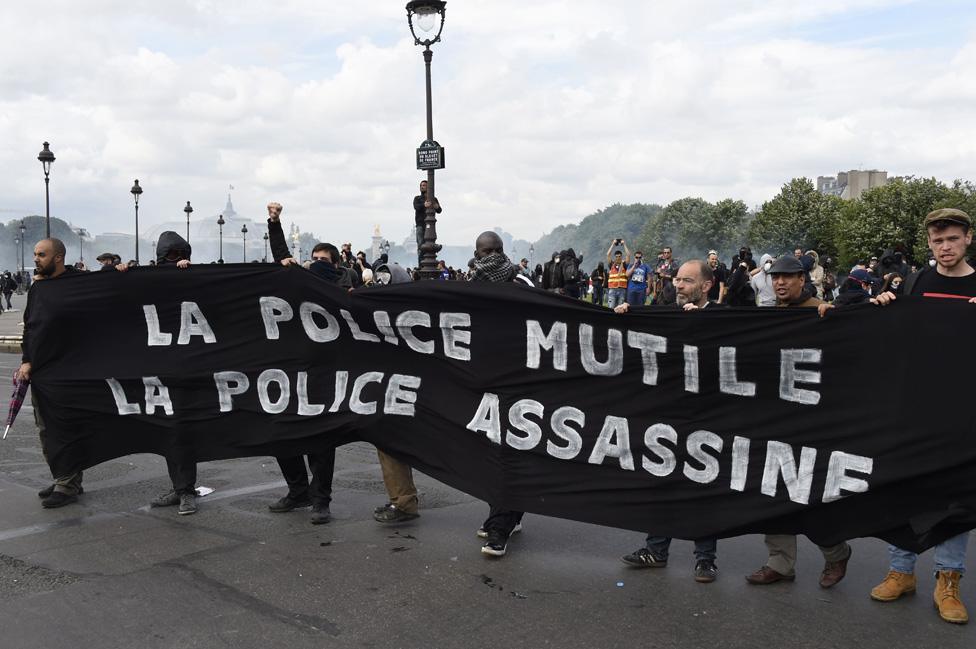
"The police mutilate, the police murder," said a banner at a Paris protest against labour market reforms
But in addition to physical exhaustion and the stress caused by fear, many policemen and women are exasperated by the conditions under which they work, and the abuse which they say is increasingly directed at them.
'France Hates You'
In Tuesday's Paris protest, for example, at least 28 officers were injured by demonstrators throwing projectiles. Unions say the number was much higher.
Slogans were chanted such as "One Policeman, One Bullet", "Police - France Hates You" and "Roast Chicken - Going Free". (The word for chicken - "poulet" - is slang for policeman.)
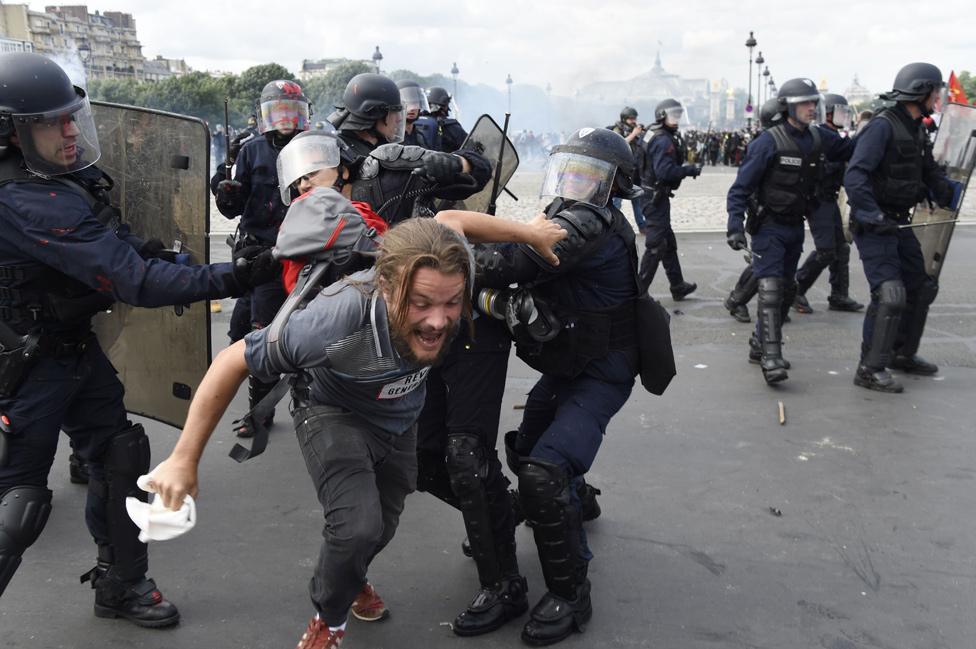
Violence erupted during the left-wing demonstration in central Paris on 14 June
According to police representatives, anti-police hatred is at large in the land, reminiscent of some of the country's darkest days of social discord.
Indeed it was at a demonstration called by police last month to protest against anti-police violence that a police car was attacked and set on fire. The occupants escaped, but shocking video footage of the incident went round the world.
Critics of the police say they have themselves to blame, pointing to other videos that show officers acting with unnecessary force to control or beat protesters.
But according to Jean-Marc Berliere, author of a history of the French police, "when a cop hits a kid, the video is immediately on YouTube with a million views. It all helps build the anti-police culture.
"But you never see videos of the daily violence that the police have to suck up."
The police have a not entirely enviable place in French popular culture. From before the Revolution they have been associated with the imposition - often brutal - of central government authority.
'I embraced a cop'
Every now and again there is an outburst of popular feeling in the contrary direction.
At the liberation of Paris in 1944, the police were hailed for leading the anti-German insurrection.
And last year - after the death of three officers in the Charlie Hebdo Islamist attacks - the police enjoyed a surge in support.
Recruitment went up sharply and the ageing left-wing rocker Renaud - once the scourge of the French police - even penned a song called I Embraced A Cop.
After this week's murders, sympathy for the force is once again growing.
For the police, that is a small consolation for increasingly difficult times.
- Attribution
- Published14 June 2016
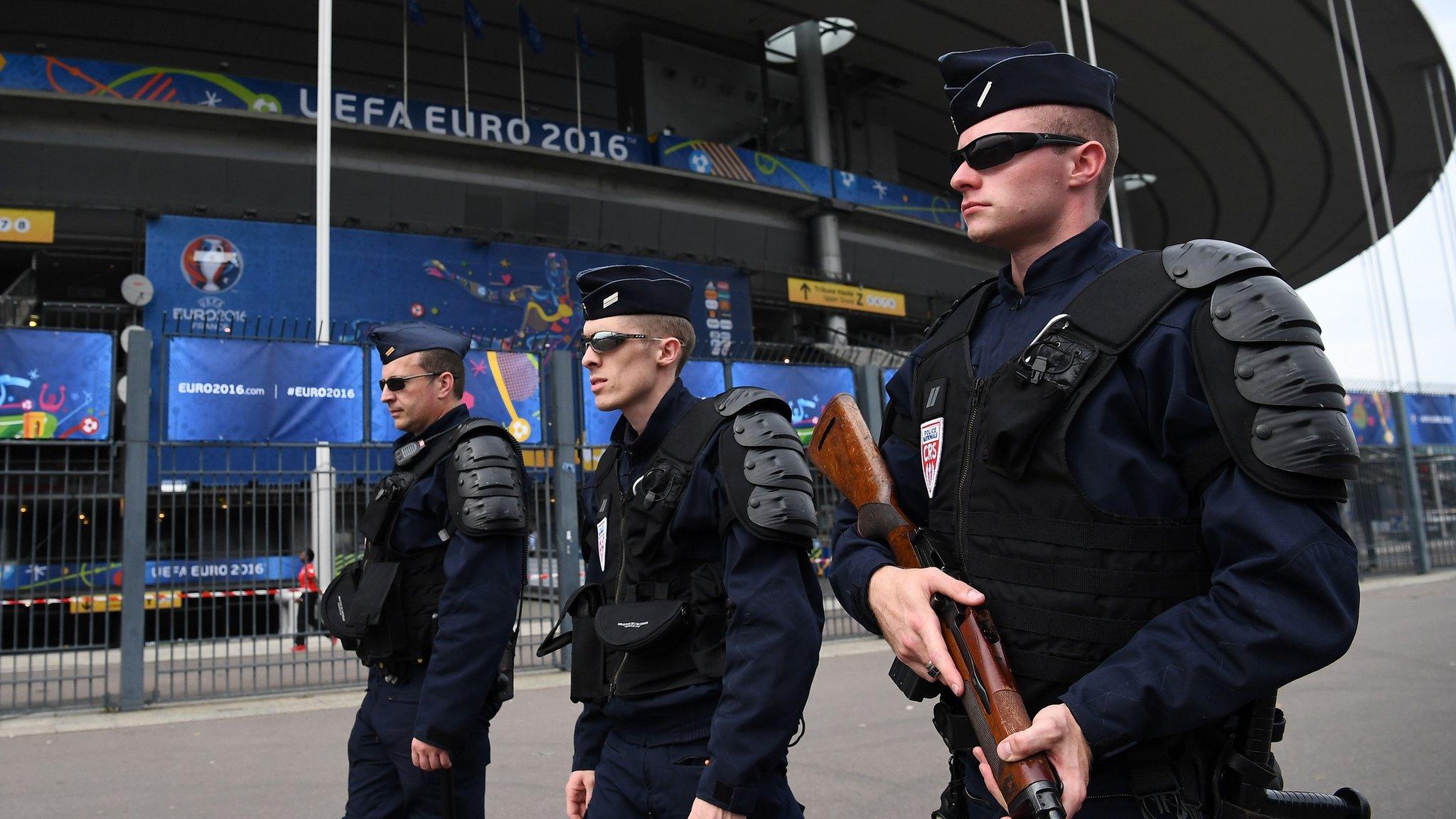
- Published9 January 2024
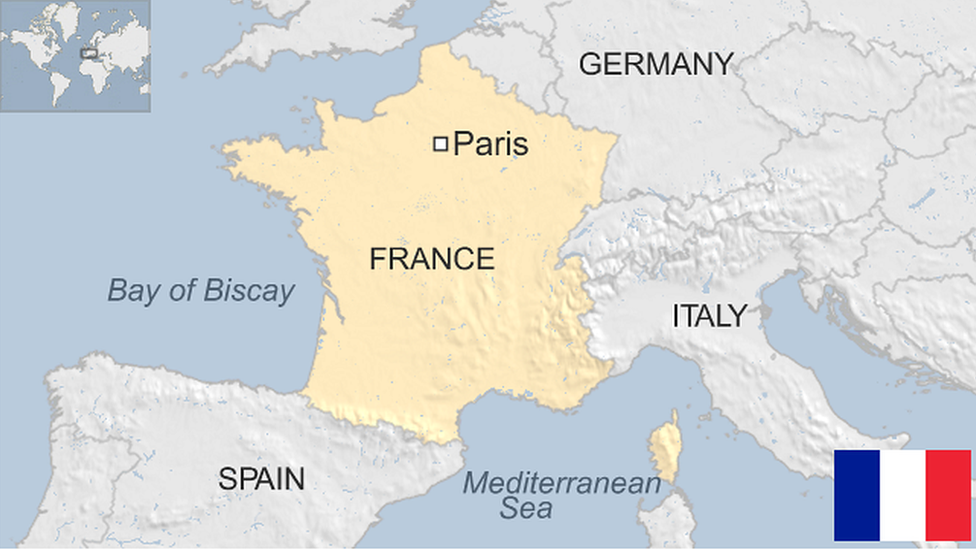
- Published14 June 2016
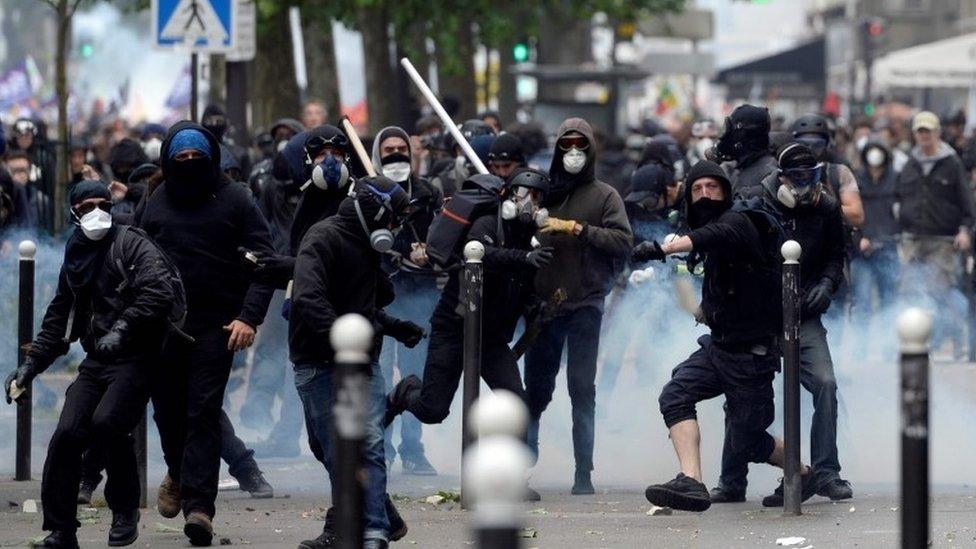
- Published21 April 2016
